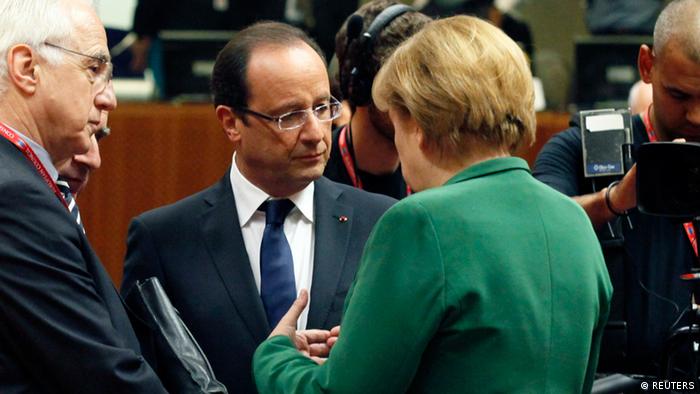At a summit of EU leaders in Brussels, a compromise has been reached on the creation of a new post for a supervisor to oversee the eurozone's banks. The deal required France and Germany to both concede ground.
On Friday, European Council President Herman Van Rompuy provided some of the details of the plan to create a banking supervisor from the European Central Bank (ECB) that would monitor the banks of the 17-member eurozone.
"Once this is agreed, the single supervisory mechanism could probably be effectively operational in the course of 2013," Van Rompuy told reporters in Brussels after 10 hours of talks.
EU officials provided further details, saying that all 6,000 of the eurozone's banks would fall under the supervision of the ECB by 2014.
'Very ambitious'
German Chancellor Angela Merkel said EU leaders had agreed that, by the end of 2012, a legal framework would be established for the banking supervisor. The supervisor's work would be implemented over the course of 2013. She referred to this timeline as "very ambitious."
While the timing represents a compromise between the eurozone's two largest economies, Germany and France, Merkel is still holding to her position that implementing a banking supervisor should not be rushed.
"Our goal is to create a bank supervisor that is worthy of its name," she said, adding that establishing the supervisor would not be a matter of one or two months.
Some optimism
French President Francois Hollande was more upbeat about Friday's decision, saying "the worst is behind us" in terms of the eurozone crisis.
"If the December European summit [where more details will be decided] confirms the decisions we took, if Greece finds a lasting solution, if Spain recovers funding mechanisms, then we will be done with a situation which weighed on markets and on the confidence in the eurozone," he said.
The scope of the bank supervisor is still up for debate, with France calling for all of the eurozone's banks to fall under the jurisdiction of the bank supervisor. The supervisor must be in place before any troubled bank in the eurozone can receive funds for recapitalization from the newly-established European Stability Mechanism (ESM).
Merkel is wary of giving the supervisor such a wide scope, as she does not want taxpayers to be forced to pay for bank bailouts in other countries.
Another issue that remains to be addressed is how the European Union's 10 non-eurozone members fit into the picture. This includes financial powerhouse Great Britain.
mz/rc (Reuters, AFP, dpa)

Comments